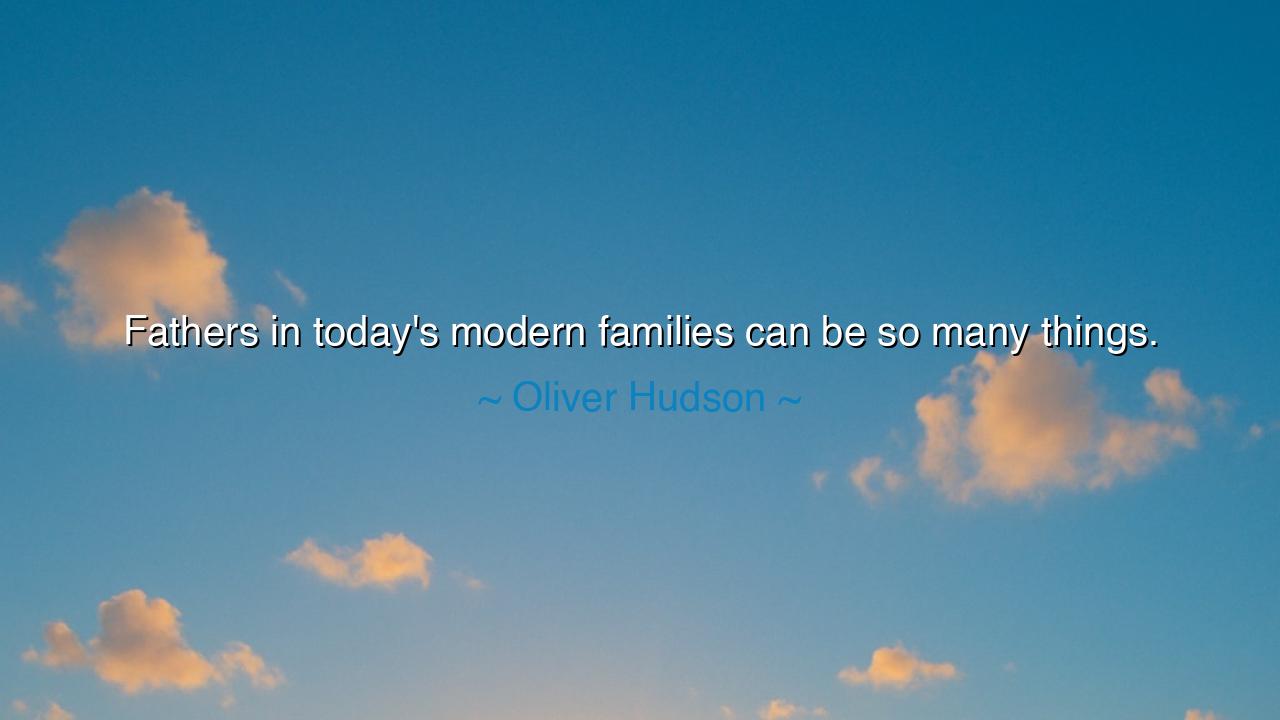
Fathers in today's modern families can be so many things.






The words of Oliver Hudson—“Fathers in today’s modern families can be so many things”—ring with both tenderness and truth. Beneath their simple phrasing lies a profound reflection on the evolving nature of fatherhood, and on the strength that comes not from dominance, but from adaptability. Once, the role of the father was rigidly defined—provider, protector, authority. But in the turning of time and the shifting of society, that single mantle has unfolded into many. The modern father, Hudson reminds us, is no longer bound to a single form; he may be a nurturer, a teacher, a listener, a guide. His power lies not in control, but in connection.
In the ancient world, the father was often seen as the pillar of the home—the unmovable stone upon which the household rested. He was distant yet revered, strong but often silent. Yet the ancients also spoke of another kind of strength, one born of wisdom and tenderness. The philosopher Seneca, tutor to emperors, once said that the wise man governs others as a father governs his children: “not in tyranny, but in care.” So too does Hudson’s reflection echo this deeper truth—that the greatness of fatherhood lies not in command, but in the art of love expressed through many forms. The modern world, though different from the ancient one, demands this same wisdom, expanded and renewed.
To say that fathers “can be so many things” is to acknowledge the diversity of love itself. The modern father may be the stay-at-home parent who raises his children with patience and laughter, or the working man who returns each evening with a heart open to play and story. He may be the stepfather who chooses love over blood, or the single father who carries two roles in one. In each case, what defines him is not his occupation or his authority, but his presence. The ancients called this virtue “pietas”—the devotion that binds one soul to another through duty, honor, and affection. Today, it remains the quiet essence of all true fatherhood.
Consider the example of Joseph, the carpenter of Nazareth, who raised a child not his own. He is remembered not for grand deeds or wealth, but for his faithful care—for being protector and teacher, for standing beside Mary and the infant Christ with humility and steadfast love. In his silence, he spoke volumes. He was many things at once: worker, husband, guide, guardian. His greatness was not in proclamation but in constancy. So too, Hudson’s words honor every father who lives not for the world’s applause, but for the quiet glory of family.
Yet the quote also carries an unspoken challenge. If fathers can be so many things, they must also be willing to change, to grow, to listen. The old patterns of distance and pride must give way to emotional courage, the willingness to show love openly and to learn anew what it means to lead. The modern family, with its complexities and blended forms, demands from fathers not perfection, but presence. To be “many things” is to adapt, to serve the needs of one’s loved ones with humility and grace. The hero of this age is not the warrior who conquers, but the father who understands.
In truth, the modern father mirrors the changing heart of humanity itself. As society grows more aware of empathy and equality, fatherhood too evolves from the rigid to the radiant—from singular strength to shared compassion. Where once the father’s love was shown in silent labor, now it can be seen in a gentle word, a patient lesson, or a hand held through uncertainty. To embody many things is not to be lost, but to be whole—to bring together strength and tenderness, discipline and mercy, courage and care.
So, dear listener, take this wisdom to heart: whether you are a father, a mother, or simply one who guides others, know that love has many shapes. Do not fear to be many things—stern when needed, soft when moved, wise in counsel, playful in peace. Let your strength be flexible, your heart be vast. For family, like life, is not a structure of stone but a living garden—it grows when tended with many hands and many kinds of love.
Thus, the message of Oliver Hudson becomes a teaching for all ages: that to be a father—or indeed a leader, a friend, a human—is to evolve with compassion. The world no longer needs unyielding pillars; it needs bridges—men and women who can span the divides of time and change. Be that bridge. Be many things, as love demands. For in doing so, you will not only sustain your family—you will illuminate the meaning of fatherhood itself, timeless and eternal.






AAdministratorAdministrator
Welcome, honored guests. Please leave a comment, we will respond soon